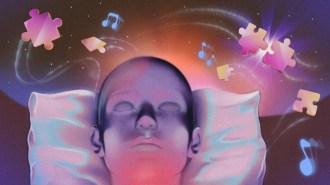Perfectionism works for some diabetics, but not for new moms
Striving for flawlessness bolsters health for some, not others
BOSTON — People who demand perfection of themselves may be affected, often for the worse, by the fact that they can’t live up to that standard. But under some circumstances, perfectionism may help people to live longer.
Pregnant women who feel like they should be ideal mothers display an elevated risk for developing postpartum depression, scientists reported May 30 at the Association for Psychological Science annual convention. Yet, perfectionist seniors who develop diabetes for the first time tend to survive longer than their less exacting peers facing the same health predicament, according to an investigation presented at the same meeting session.
The director of the diabetic study, Prem Fry of Trinity Western University in Langley, Canada, called the finding “highly unexpected.” Fry had suspected that death might come especially quickly for perfectionist seniors with diabetes.
In a 2009 study, Fry and a colleague found that, among 450 community-dwelling seniors ages 65 and older, those reporting expectations of perfection for themselves on a brief questionnaire tended to die at least several years earlier than those who went easier on themselves.
In contrast, the latest work suggests that a perfectionist outlook may foster longevity among senior diabetics by encouraging them to manage their illness with special care, Prem speculates. Many diabetics of all ages find it challenging to monitor their blood glucose every day and to refrain from eating sweets.
Fry’s findings underscore how perfectionism, at least when directed at oneself, can be related either to good health or to bad health, depending on the context, remarked Patricia DiBartolo of Smith College in Northampton, Mass.
Recent investigations have consistently uncovered relatively poor physical and emotional health among people who think that others expect perfection of them, DiBartolo noted.
Fry’s team tracked 385 seniors, ages 65 and older, for 6.5 years. Participants were recruited in 2001 at Canadian health clinics. All had received a diagnosis of type 2 diabetes within the previous two years and displayed no intellectual or brain impairments.
Overall, 117 people, or 30 percent of the total, died during the study. Among seniors who had scored high on a measure of “self-oriented perfectionism,” nearly three-quarters survived, compared with about 62 percent of those with low perfectionism scores.
Some researchers regard perfectionism as a combination of two much-studied personality traits, conscientiousness and neuroticism. The latter trait largely involves emotional instability and distress.
But high scores on the self-oriented perfectionism scale predicted longer survival among seniors even after accounting for their levels of conscientiousness and neuroticism, Fry said.
Perfectionists often try to impress others by bragging or trying to promote their faultless qualities, avoid situations in which they might show imperfections and refuse to admit failures to others, said Gordon Flett of York University in Toronto.
Flett reported his findings on how perfectionistic tendencies contribute to the risk of postpartum depression in new mothers.
Using questionnaires, Flett queried 100 women during the final month of their pregnancies and one month after giving birth about their perfectionism, personality and mental health.
Postpartum depression occurred substantially more often among women who had demanded perfection of themselves while pregnant than among those who had cited few or no signs of perfectionism. This association held after accounting for pregnant women’s feelings that others demanded perfection of them and for any depression symptoms that had been present during pregnancy.
“This is the first evidence that new mothers who need to seem like a perfect parent are at risk for depression,” Flett said.







